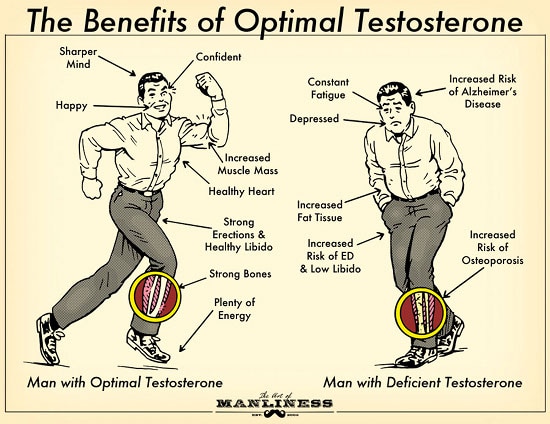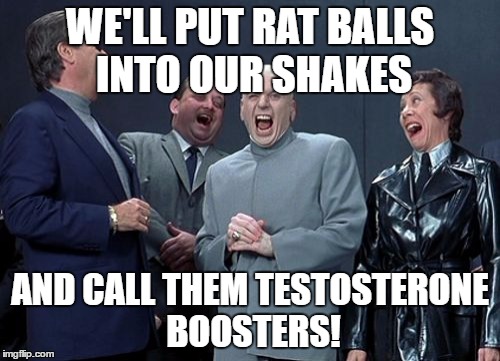
The Important Things Low-T Commercials Don’t Tell You

The important things low-T commercials don’t tell you.
As urologists, the experts in male hormones, we wanted to discuss a topic that has a lot of misinformation and mismanagement out there. Testosterone supplementation and low T levels.
Boosting your testosterone levels has helped many men improve their lives and feel like themselves again. When used properly, it is a safe and proven treatment. However, far too many men are using testosterone without understanding the choices they’re making. Far too many health care "providers" are prescribing it without the proper monitoring or training. For this reason, it’s absolutely critical that you have a knowledgeable and trusted physician working with you. There is a fine line to walk when delving into testosterone supplementation. Giving hormones is both art and science. You need someone who is fully aligned, you need someone who gets it. I’m not trying to sell you on some BS here. Testo supplementation has real side effects that are often under-counseled. But I’m also not trying to scare you. When suitably administered, it can have life-changing impacts for some men.
So let’s introduce some of the concerns men have about testosterone levels, and shed some light on how we diagnose and treat this common condition to get you feeling strong again.

What is testosterone? What does it do?
Testosterone is often considered the "male" hormone and is responsible for many traits that are considered manly. Testosterone is produced in the testicles, and a surge in this hormone is what triggers puberty and the development into a man. Testosterone causes the development of normal facial and body hair distribution (unless you’re Dr. Trotter, then it triggered a furry back sweater.) Testosterone is responsible for the growth and development of lean muscle mass, sperm production, sex drive, and contributes to the normal functioning of many other body systems including cardiovascular and brain function and normal erections. Testosterone does great things: it helps you grow the muscles to defend yourself; it helps you grow the beard that makes you look like a badass, and it can help your mind stay sharp so you create a witty response to avoid a need for either.

Testosterone levels vary through the day and are highest in the morning. Unfortunately, starting usually between the age of 30-40, testosterone begins to decline. It has been estimated that more than 12 million American men suffer from symptoms of low testosterone, most of them undiagnosed and untreated. Is low testosterone just a "normal part of aging"? Yes, it is. But so is vision loss, and no one hesitates to get glasses when they can't see well any longer. Why would you not work to correct this too, if it's affecting your life and causing you to lose your "mojo"?

Do you have low T symptoms?
The symptoms of low testosterone make sense when you think about all the functions of testosterone we talked about above. Many men feel constantly tired or fatigued without testosterone's effect on the brain and mood. It can also lead to loss of mental sharpness. Feelings bordering on depression are common and this distinction would need to be explored. It is very common to have a loss of libido or sex drive. Many men have gained weight and, regardless of the time spent in the gym, struggle to lose the weight or gain back their muscle. It is common to have worsening problems with erectile function. This may be a separate problem but is often connected. The "Leave it to Beaver" style meme below is actually a decent summary.

What testing would you need?
Usually, the evaluation of low testosterone begins with a discussion about your symptoms and experiences. A blood draw to check your total testosterone is almost always needed. Often, your doctor will check your free, or "bioavailable", testosterone too. Classically, the low end of normal testosterone was considered ~250ng/dl. We believe less in treating a lab value and more in treating a patient. There are men with low levels seen on lab tests that feel fine, and they don’t need any help from us. On the other hand, there are guys with low-normal or even normal tests that have all the symptoms of low testosterone, and many of these guys could benefit from a conversation about the options to boost testosterone. If you choose to start any type of medication, regular lab monitoring in the future will be needed to ensure your levels are safe and you aren't developing side effects.
So, what options are out there and which are best?
There are many good treatment options to help boost testosterone. No option is perfect for every guy, but for almost everyone, we can find an option that works well. This is a brief overview of the pros/cons of each:
Creams and gels come in many forms and are usually applied daily. They generally lead to a very steady testosterone level, but they can be cumbersome to apply and you must be careful you don’t transfer them by contact to a wife or daughter.
Patches are applied and changed daily. They have less risk of transfer than gels.
Injections are usually given every 1-2 weeks. This is usually the cheapest option and thus one of the most popular. However, it commonly produces a roller coaster with high levels for the first few days and low levels prior to your next injection. Also, you have to stick a needle in yourself.
Pellets are implanted under the skin, usually near the hip or buttocks. They slowly release their testosterone over ~3 months so they have less day to day maintenance than other options. The dose is difficult to adjust, so this is typically reserved for guys who are well established on testo supplementation.
hCG is a medication that simulates a hormone called luteinizing hormone that is released from your brain and stimulates your testicles to produce testosterone. By simulating this hormone, we can often boost levels without some of the side effects of actual testosterone supplementation.
Clomid is a medication that works in the brain one level higher than hCG does. It stimulates the release of the hormones LH and FSH, that trigger your testicles to make testosterone. Like hCG above, it can boost T levels without actually giving testosterone.
"Supplements" are of varying use. Since they’re not FDA regulated, it’s difficult to know what they truly contain and they can make any claim they want about efficacy. That being said, if they’re working for you, go ahead, it’s probably not going to hurt you.

How could this help you?
Many men are able to return to a normal testosterone level and feel like "themselves" again. They describe more energy, improved sex drive, better "zest for life." It is common to have an easier time with weight loss and guys often feel it’s easier to get motivated to go to the gym. Erections may show some improvement—but most often that is related to a problem with blood flow. Energy is often better. There is varying data, but there is certainly some evidence that maintaining a normal testosterone level improves overall cardiovascular health, though this is not certain.

Generally, returning to a normal testosterone level helps you enjoy the normal things in life again. This is why it’s worth getting tested and finding a reputable doctor to help you, so you can get back to being you.
What should you be aware of?
The good thing is, turning into a meathead from Jersey Shore should not be a risk, as long as you see a reputable physician who monitors your lab work. However, no medication is without risks, so let’s discuss them.

Let’s start with something every woman knows: your balls are not smart. When we give testosterone, the message they hear is "we don’t have to do our job anymore." It’s not uncommon for your balls to shrink. They often stop producing sperm. This means there’s a significant chance you could end up infertile. Sadly, I see tons of young guys who were never warned of this risk. For some people, it doesn’t matter, for others it is devastating.
On a similar note, if you use testosterone supplementation for extended periods of time, you will most likely need supplementation for life. Which is why I first mentioned there is both an art and a science to doing it the right way to minimize this risk.
Does testosterone increase the risk of prostate cancer? No one can say for certain. If you have prostate cancer, testosterone can feed it. No research has ever proven that testosterone causes prostate cancer, but we’ve always worried about it. Your physician should watch your PSA if you are taking testosterone. Does it cause cardiovascular disease? Again, this is unclear. The bulk of the data says maintaining normal T levels actually lowers risk, but some recent data contradicted this. Which is true? This is yet to be determined.
What else? An enzyme in your body can actually change testosterone to estrogen. Uh oh! Particularly if you aren’t monitoring levels well. Your doctor should be sure your testo is at normal levels, not too high, and should monitor your estradiol levels while on supplementation.

These are the big concerns to be aware of, but there can always be other side effects we haven’t discussed. The "bioidentical" testosterone carries all of these same risks. If you are on testo supplementation and your treating "provider" didn’t warn you about any and all these things, you may want to be wary. You may not be getting your medications and advice from a reputable place.

So, if you have concerns about testosterone levels, I hope this was helpful. If you’ve had some of these issues, hopefully, you know more about what to look for. If you’re already on medication to boost your testosterone, I hope you learned something about the options and the risks. I want each of you to spend your life feeling well, strong, and happy.
This Content is not intended to be a substitute for professional medical advice, diagnosis, or treatment. Always seek the advice of your physician or another qualified health provider with any questions you may have regarding a medical condition.
You Might Also Enjoy...


Navigating BPH Therapy

Understanding Low Testosterone

Treating Erectile Dysfunction with Low-Intensity Shockwave Therapy

KSPtabs...an over the counter kidney stone solution.



